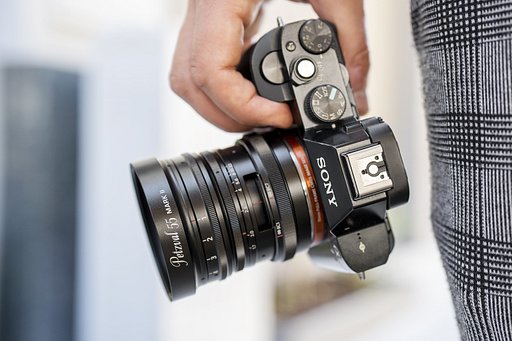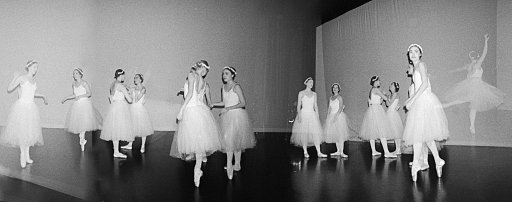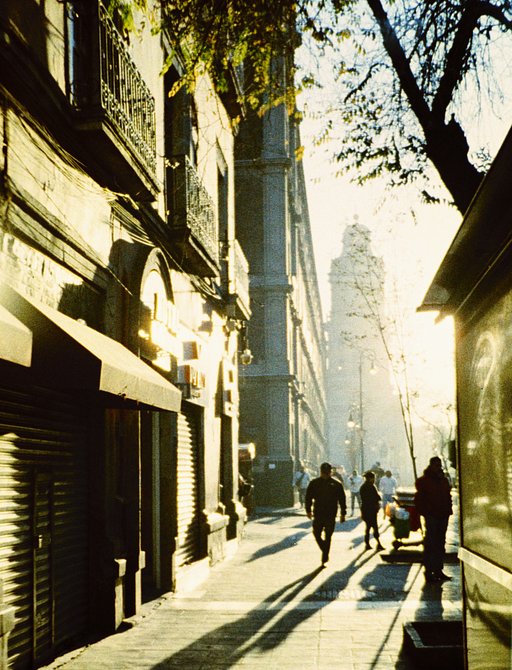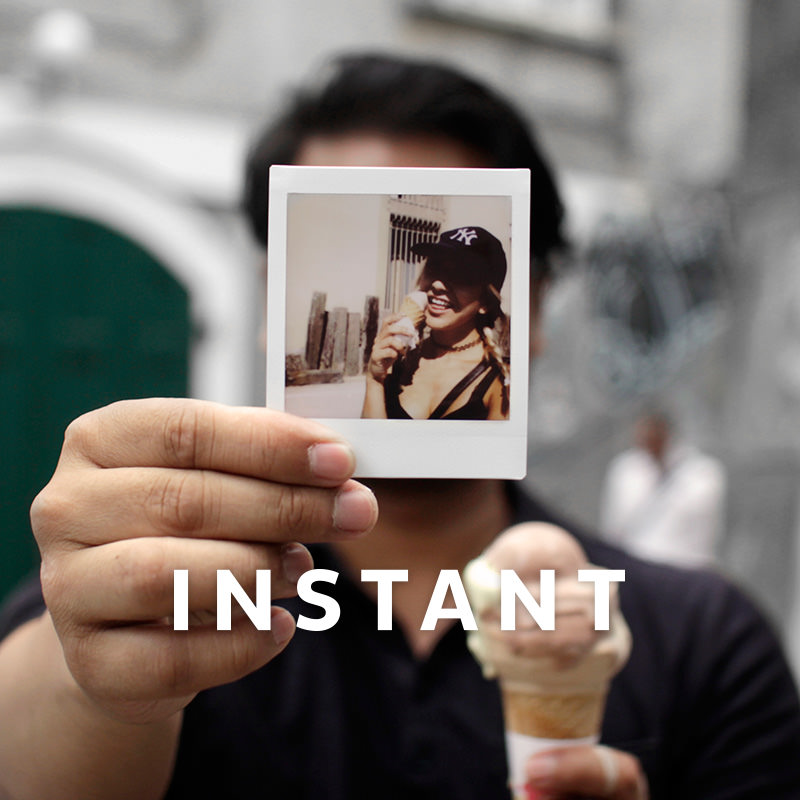Rainer Turim's Neighborhood on Film: An Interview with Noble Spell
8 Share TweetNoble Spell is a film photographer and videographer based in New York City. He is an active member of CENO, an artist collective started by film photographer and creative directors Asha and Elijah Maura, who organized a photography show in September 2017 at the Lomography NYC store. In addition to CENO, Spell works with Corpus, a collective of friends made through the New York City concert scene, including band Show Me The Body. Before Spell came to New York from New Haven, Connecticut, he spent his last three years of high school photographing weddings. In New York, Spell is a frequent supporter of the local music scene, in addition to his active DJing at Corpus-hosted events. Meet Noble Spell, interviewed and photographed by young photographer Rainer Turim for Turim's neighborhood on film series.

What got you into shooting film?
Believe it or not, Lomography got me really into film. I was shooting film, I went to a program at Wesleyan, a weird summer program that doesn't exist anymore — it's called CCY. It was the best because they took kids from all over America and essentially gave them a college experience, you know, so after my sophomore year of high school, I got to live at Wesleyan by myself for six weeks and just do photography. Up there, we were shooting mostly black and white, but there was an Urban Outfitters around, so we'd go and cop color film from the Urban Outfitters, and that's where I started shooting Lomography. Other than black and white film, the first film I've ever shot was the Lomography Redscale. I shot film as a kid, but buying film as an adult was Lomography Redscale.
As we talk on St. Marks Place, Noble looks at someone passing by.
I know that man, but I don't know where I know him from.

Can you talk about your work with Corpus?
My work with Corpus, that's really something that came up organically, you know. That's the whole thing about Corpus, is that it's supposed to be something that's not like a cool kid's squad, something that you feel you don’t have to buy into; I met those kids when I went to college, the college that I dropped out of, and then I went to shows with them and got to photograph shows, back in the day. That's how I got into photography, being at concerts with the camera and wanting to remember it. And then I moved to New York two years later, classic I fell in love with a girl story. We were like, "Yeah, you know what? Let's just move to New York."
Do you mind if I take photos?
Not at all, not at all.
It's just the flash.

Yeah, dude, do the flash. You got to do the flash. I came to New York, I was mad lonely. I saw my man Noah, who was the drummer for the band and then he was like, "Yo, make sure you come to all the shows, like come through. You have a family here." And then the rest is history. After I linked up with them again—
Rainer takes the first flash photo.
Haha, that is a good flash.
I try to warn people.
Your pictures will be good, though! They'll get used to it eventually. They went from just going to their shows, which is a big community around, because there aren't as many shows that young people can actually go to, you know? A lot of these events are twenty-one plus, so that community is real special; we try to do all-ages shows and try to have it be as much as a community or as a family as possible. Even if you can't buy a ticket, we'll try and sneak you in— that's the thing. Just try and build Corpus.

What got you into photography originally? You said as a kid?
My dad was really into film photography; my dad honestly should've been an artist, like he's one of those people that's really an art — cultured dude, loves literature, but had a kid at sixteen so he went to the army to make a living. And when he was in Korea, he was super into taking photos and his interests always sparked me; I can look back on my childhood and there's pictures of everything, cause he was always documenting things, but he made sure — my youngest memories even in kindergarten, I remember walking around kindergarten with just a simple point and shoot camera, you know? So, my dad definitely passed it onto me. And then in high school, I was really into video work, and trying to get better at my video work, I realized if I can't frame a video like a good picture, then I don't know how to do video.
I liked taking pictures and I had a digital camera and that's what really started my photography, but my interests in photography really came when I went into the darkroom.
Can you talk about your interests in concert photography or the DIY (do-it-yourself) community, or what you would call it?
Yeah, it is DIY— yeah, eh—
Some people don't like that term.
I know — I think at certain points, I don't like that term. You know, cause it gets a bad rep.
Yeah.
And especially because in New York, the DIY community, if I'm going to be completely honest, is often like young kids not from New York, you know, who come into New York and they're like, "I'm gonna make a scene by myself!" But they don't realize, one moving into somebody's — who's been here before, you know, you're moving into a neighborhood, even though it might be desolate, you're making something out of someone's neighborhood. And I think that that gets a bad rep. But, I love the community because it gives kids a place to go, just straight up; being under twenty-one anywhere in America, you have very few places to go, other than school or a library.
Heh.
I really like the community and I guess you could say, it is somewhat of a scene or just the concert community, because it gives you a place to be and that's one of the most positive things you can do for a young person, is give somewhere to be; young people are always getting run out of places. If there are six young people on the street, the cops are like, "What are you doing here? Get out of here." So I like shows cause it gives a chance for young people and old people to mix; it gives a chance for the low class and the high class to mix, especially in New York. You never know who's going to be at a show. Larry David might pull up —which as a matter of fact, Larry David has pulled up to shows. Everyone — Bjork might pull up. But then also your friend who is homeless might pull up. So I just think it's special cause it really is a mixing pot of cultures and everything. The thing I love about the New York music scene so much is that the hip hop kids go to the rock shows, and the hardcore rock kids go to the hip hop shows. There's a certain solidarity in realizing, "Hey. We're making music. We're trying to do something positive. We're having a hard time in the city." You can have a terrible week, but everyone comes to that one or two shows a month and reminds themselves why they're in the city.

What do you think you're trying to produce in your photography?
I'm trying to produce moving images.
I'm not trying to produce a picture of something — not to say any picture is just a picture of someone. I'm trying to produce something that anyone can connect with; even if you don't know who the person is, or you don't know what the location is in a picture, I want a lady that in Thailand who's never been to America to find something in it that she can relate to. I want to, and I want my peers to, create universal images — not just images that show a scene or show a person, because they're a cool person. Even if it's a cool person, I want it to capture something in their eyes that my grandma can see, and I think there are so many images nowadays that we shouldn't be worrying about quantity, we should be worrying about quality of these images. If you think about someone on Instagram, they scroll so much; you want to make something that makes them want to stop and think about it, and then tomorrow they'll remember that picture.
I think you told me before when we first met about how you used to shoot weddings.
Haha.
I thought that was just a crazy transformation.
Yeah, haha, it definitely was. The wedding thing was really — I just had a digital camera and the first wedding I ever shot was for my sophomore year English teacher. She was like, "Oh. You're a really good photographer. My wedding photographer cancelled on me last minute.” Last minute cancelling for a wedding photographer is like two months. The cool thing about being a wedding photographer is you get an eye into a world as a sixteen year old. I learned so much about weddings, more than I should've. I might as well been watching HGTV. But I don't know, as much as that was cool, and it definitely fueled my photography career and allowed me to buy lenses, like I got to buy a 50mm f/1.2 when I was in high school, a Canon L-Series, and ambient flashes. It definitely heightened my career because I got access to things that I wouldn't have gotten, but I hated it. It was the worst because you are trying to create striking images, but if you're shooting a wedding every week, or every two weekends, it becomes dry. It also sucked to be a young person and be looking at love like that. I was looking at people get married every week, and sometimes I'd be taking pictures of the groom, or the bride, and I'd be like, "I can see in this picture that they don't wanna get married." I was shooting weddings from my sophomore year until I started college. I was shooting at least a wedding a month, but it bored me. Taking pictures for money, it gets really boring. It made me not have fun taking pictures. So, the thing about show photography and being in New York is as much as it is a complicated area, being around other photographers really made me get creative again.
I feel that too.
When I was just shooting weddings and working for myself, it wasn't as cool as when I was at an art program or honestly being in New York now. I feel like I'm in a school with other photographers, cause there are so many other photographers shooting independently. I think that you need peers to challenge you, not even as just a competition, but like friendly competition. You pick up skills; you learn the best from other people. So I do love that about the film thing right now — I have contemporary photographers that are my friends, that are my inspirations and I've never had that before.

What was your first film camera?
My first film camera would be a Nikon F6; it's an SLR from the 90's. It's still a beast, because you can put modern day Nikon lenses on it. It's got autofocus, really good metering, like 64 point metering; it's essentially a Canon T2i, but a film camera, and when my dad did detective work, he would use that.
That is insane. Wow.
Yeah. He used that with a big zoom. Then my dad had to retire, probably by the time I was in the fifth grade. By the time I was in high school, he wasn't using the camera like that, and I got to use it. He had great lenses. I learned how to shoot on Nikon, even though digitally I shoot Canon. The Nikon glass is amazing. The first digital I ever bought myself was a Canon T2i.
Classic.
Yeah, which I should've still kept. I'd tell any photographer, don't worry about your body. Get a decent body and really nice lenses. The photographer who I learned the most from — this dude named Pete McQ, who was another English teacher of mine, who just had a photography hobby. He was the type of dude who took really nice pictures of cars in really nice lighting, like really HDR. He was like on top of it technically. He shot with a 2002 Canon, but he just had really nice lenses, like an 85mm f/1.4, a 50mm f/1.2, 75-200mm f/2.8 by Canon — the top quality lenses. Those are the lenses I started shooting weddings with, and the first medium format camera that got me stuck on medium format was a Mamiya C330. It's another twin-lens, but the thing about the Mamiya is that it has interchangeable lenses, so you can do a super-wide on medium format or a really close up portrait lens, like you can swap out lenses — that's the only one. And that had me stuck on medium format.

And what was the camera you were shooting with at the —
Mamiya 7, which I had one earlier in my lifetime; I had one while I was in high school, and took it for granted. I found it on eBay for like seven-hundred dollars; it's a sixteen-hundred dollar camera, but the thing is with a lot of Japanese cameras is you can get film cameras cheaper in Japan, and there's just more of a rotation for it. I was at a shoot and carrying it on a tripod and it fell off the quick release and broke. I don't know, some people consider that the world's best camera. So I then as an adult, had to work my way up to getting that camera again — which was a lot.
What's the next shoot?
Right now, I'm working on a lot of videos. I did a video with Show Me The Body. We did a K-9 video which was really cool, because we got these dog trainers to bring these crazy attack dogs, and then my next shoot is tomorrow.
Check out more of Noble's work on his Instagram.
















No Comments